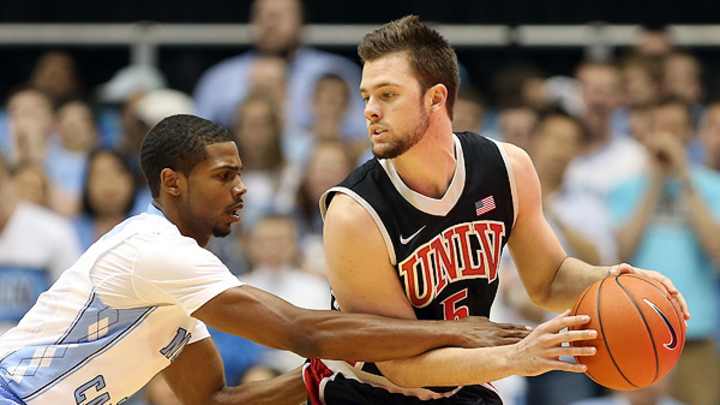The nuances underscoring Katin Reinhardt's transfer

Could Katin Reinhardt's desire to become a top pro, derail his college career? (Streeter Lecka/Getty Images)

On the surface, the holiday weekend transfer news involving UNLV's Katin Reinhardt seemed curious. As a true freshman this past season, Reinhardt had copious carte blanche, taking more than nine shots a game (while only making 36 percent of them) in over 29 minutes per contest on a team with a number of more experienced and/or more talented options. What more could a first-year player want as part of a nationally relevant program that also was featuring a soon-to-be high-lottery NBA pick?
As it turns out, the freedom to jack shots from the wing might not be what Reinhardt (or his handlers) wanted for him, at least going forward. UNLV head coach Dave Rice provided the Las Vegas Review-Journal with Reinhardt's explanation for the transfer.
"He said that he feels his best opportunity to play in the NBA is to play more minutes at the point guard position,” Rice said. “Katin would have had an opportunity to compete for minutes at the point, but I’ve never guaranteed anyone that they will start or play a certain number of minutes."
Now, there are several things in play here ...
1) A player is entitled to make what he believes is the best choice for his basketball aspirations.
Reinhardt didn't show much distribution inclination on a team that lacked a true point guard, but that doesn't necessarily make him incapable of those skills, especially if that's primarily what he wants to focus on going forward. He has the size to operate at the 1 with effectiveness, and if he's willing to commit to the specific skill development and mentality required at the position, at least as it projects to the NBA level, then he's entitled to try to mold himself that way. If he didn't feel that was going to happen at UNLV, then choosing a different location makes sense. At least he gave his head coach a legitimate reason for the transfer.
2) That said, non-star players often suffer from delusions of grandeur.
Matthew Dellavedova had an excellent career at Saint Mary's. He was one of the best point guards in the country, a beautiful passer of the ball with an excellent stroke from deep despite being the focal point of every opposing defense. He made his Gaels teammates a lot better. He played four full seasons in college and was part of Australia's Olympic team last summer.
And according to most people who follow the NBA draft, Dellavedova will be fortunate to get drafted at all. Draft Express has him as the 81st best prospect available and ESPN's Chad Ford lists him as a second-round/undrafted prospect.
The point is Reinhardt has miles to go to even become a point guard as good as Dellavedova, who has similar size and also isn't close to an elite athlete in terms of pro potential. And if he gets to that level, he's a marginal pro. Maybe.
Reinhardt is not in the Michael Carter-Williams mold, where overt length and athleticism can overcome certain shortcomings in current skill. Focusing on what he needs to do to make the NBA seems crazy at this point, and there's nothing saying Reinhardt couldn't play the 2 at the next level. You have to make the switch as soon as possible for there to be any chance of it working, but the obsession with becoming a pro before you even become a good college player has derailed many players.
3) There's no guarantee Reinhardt would have had as prominent a role this upcoming season, despite UNLV's personnel losses.
The Rebels definitely are in some transition, having lost Anthony Bennett to the NBA, Mike Moser to a grad-school transfer, and Anthony Marshall, Justin Hawkins and Quintrell Thomas to exhausted eligibility. That said, they have a lot of pieces coming back again next year, beginning with Khem Birch inside and Bryce Dejean-Jones on the wing. UConn transfer Roscoe Smith is now eligible. There is another solid entering class coming. More relevant to Reinhardt's decision, UNLV has multiple potential options at the point between returnee Daquan Cook, juco import DeVille Smith and incoming freshman Kendall Smith.
While none of them have (much) experience at the high Division I level, they're more traditional point guards, and one of the Rebels' major issues last season was the lack of a traditional facilitator at that position. Converted shooting guard Marshall did the best he could, and statistically had a pretty solid season, but if you watched UNLV enough, you realized how often their offense was out of sync or had the wrong guys taking the wrong shots.
Reinhardt was one of the major culprits. He was a low-efficiency, streaky volume shooter on a team that had better offensive options. Rice never fully (or properly) reined him in last season, but that doesn't mean Reinhardt would have similar liberties this season, especially if one of the point guards comes good and makes proper decisions with the ball. Coaches learn from their mistakes, too. It was pretty clear by the end of the season that Reinhardt was hurting the Rebels' offense, especially since he wasn't even as good or as diverse in his approach as UNLV's other volume shooter, Dejean-Jones.
Then, as Rice underscored in his quote, he wasn't going to promise Reinhardt minutes at the point when he has other options coming in. If Rice truly believed Reinhardt could play heavy minutes at the point next season, he certainly could have sold him on that in May.
